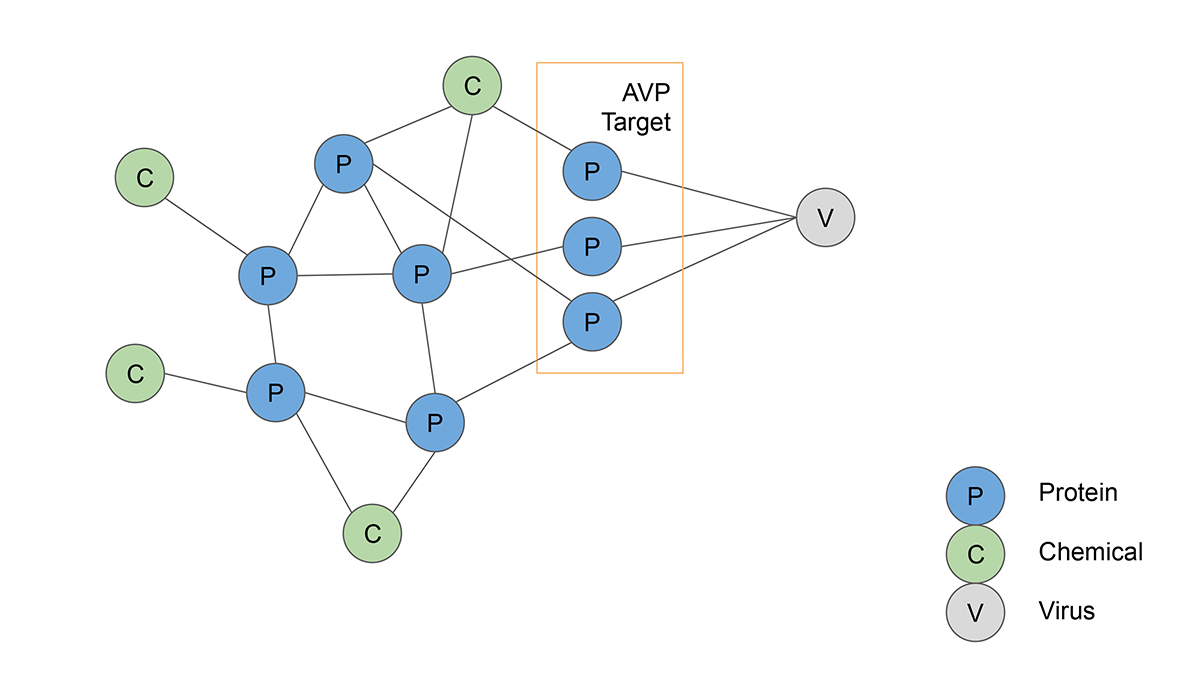Skymount Medical Partners with LSU to Test COVID-19 Treatments Discovered by AI
Artificial intelligence software developed by an interdisciplinary team of LSU researchers could shorten the time for drug development from 15 years to 15 days; save lives, reduce symptoms.

Artificial intelligence helps map known antiviral peptides (AVPs) to different cell mechanisms by analyzing protein-protein interactions. The AVPs are then ranked by how effectively they can slow the propagation of coronavirus in the human body.
BATON ROUGE, June 5, 2020 — A Calgary-based technology company, Skymount Medical, has signed a licensing agreement
with Louisiana State University (LSU) and is working in partnership on potential COVID-19
treatments.
The artificial intelligence platform DeepDrug was created by an interdisciplinary team of Louisiana State University researchers
led by Dr. Supratik Mukhopadhyay, associate professor in the LSU Department of Computer
Science, and Dr. Michal Brylinski, associate professor in the LSU Department of Biological
Sciences with a joint appointment in the LSU Center for Computation & Technology (LSU
CCT). The team, which also includes Adam Bess, an LSU doctoral student in computer
science, is a current semi-finalist for the IBM Watson AI XPrize, a $5 million award for innovative teams using artificial intelligence to tackle
global challenges.
Artificial intelligence, or AI, can dramatically shorten the time to discover new
drug compounds—from years to weeks. Whenever the DeepDrug platform is able to identify
currently FDA-approved antivirals as effective COVID-19 treatments—a practice known
as drug repurposing—it also becomes possible to get treatments to patients faster.
This could save 90% of the time from initial discovery to getting a drug on the market.
DeepDrug can also evaluate different compounds and drug combinations for potential
toxicity to verify the safety of proposed treatments.
“This licensing opportunity with Skymount is just another indicator of the abilities of the [LSU DeepDrug] team and the strength of the tools they create.”—Sam Bentley, LSU Vice President of Research & Economic Development
Essentially a drug design tool, DeepDrug uses AI-based techniques to process one of
the world’s most comprehensive datasets of more than 300,000 drugs and compounds and
also to analyze viral mechanisms and corresponding data accumulated over many years
of research.
Skymount is currently seeking Canadian and U.S. government support to remove lag time
in the legacy drug approval process—again, in the context of drug repurposing—to advance
testing in the lab and get treatments to those who need them faster.
“The excitement is palpable as we progress towards clinical trials,” said Zubin Kothawala,
CEO of Skymount Medical. “Vaccines take time to develop, but treatments for COVID-19
can be available sooner. We had been working with LSU’s experts on AI on another project
using Skymount drones to tackle ecological problems when we became aware of the DeepDrug
team’s success in using its AI to discover antibiotics and antimicrobials. We were
amazed at how quickly the technology could be used to also find and create antiviral
treatments.”
“We are proud of the DeepDrug team and their amazing work,” said LSU Vice President
of Research & Economic Development Sam Bentley. “This licensing opportunity with Skymount
is just another indicator of the abilities of the team and the strength of the tools
they create.”
Some of the new drugs the AI proposed would need to go through rigorous and lengthy
testing to prove they are effective and safe, while pre-existing drugs do not. There
are about 90 antiviral drugs on the market that have already been approved by the
FDA. Most of them have so far been used to treat HIV, hepatitis B and C, and herpes,
but DeepDrug indicated that some would be effective against coronavirus as well.
“DeepDrug has the power to perform 15 years of drug discovery and due diligence in 15 days and leads the pack in medical AI in terms of accuracy, speed, and performance.”—Zubin Kothawala, Skymount Medical
The therapeutics DeepDrug is developing can potentially inhibit viral mechanisms in
a patient’s body and ease symptoms, thereby lowering the mortality rate. These treatments
are being built using compounds and drugs already approved by the FDA. They can prevent
viral cell entry and cell exit, as well as RNA transcription, which is a necessary
step for any virus to replicate itself in the body. They prevent the virus from entering
cells by inhibiting endocytosis/membrane fusion with the SARS-CoV-2 ACE2 spike protein.
They also save healthy cells from infection by inhibiting exocytosis, where viral
molecules are secreted from infected cells.
The DeepDrug team is supported by Dr. Stephania Cormier, a respiratory immunotoxicologist
and associate vice president of research at Louisiana State University; Patrick McGrew,
a retired attorney and philanthropist; Dr. Oleg Bess, a physician from Los Angeles,
Calif.; Frej Berglind, a graduate student at LSU; and Joseph Feinstein, an undergraduate
student at Brown University.
“This is a major breakthrough,” Kothawala continued. “Treatments are being discovered
through the most advanced drug-discovery AI engine available. DeepDrug has the power
to perform 15 years of drug discovery and due diligence in 15 days and leads the pack
in medical AI in terms of accuracy, speed, and performance.”
Skymount Medical is part of Skymount Global, which recently completed a cross-Canada
expansion from Calgary to Toronto and set up its first U.S.-based office in Baton
Rouge, La. Skymount Global provides drone and satellite communications, technical
support, cloud development, and AI technologies. Its world-leading drone-based pipeline
inspection service was developed in the same LSU lab as the DeepDrug AI. Skymount
Global has previously created drone-based systems powered by artificial intelligence
for wildfire detection, agriculture, and border security.
Elsa Hahne
LSU Office of Research & Economic Development
225-578-4774
ehahne@lsu.edu